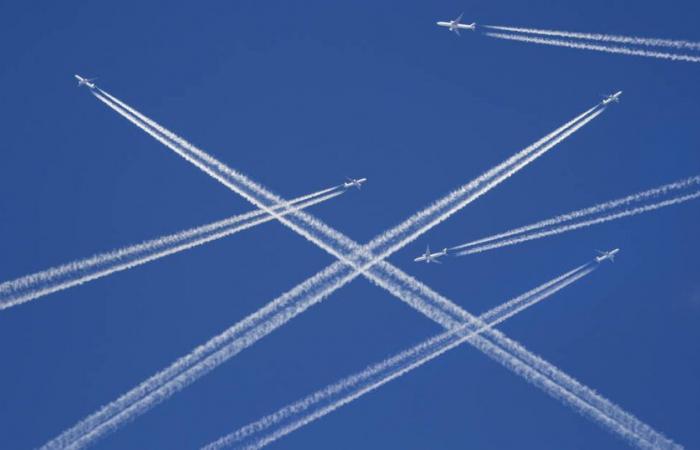
The transport sector is the sector that emits the most greenhouse gases in Europe (26.2%), as in France (32.3%). Their role in the climate emergency is therefore essential, beyond the health benefits that the electrification of uses and the limitation of transport would have. Among the modes of transport, road transport crushes everything, with 71.7% (including 60.6 points for cars alone). But civil aviation, with 13.4% of transport emissions in the EU (and 3.8% for all sectors combined) is also singled out, in particular because of its unequal nature – only 1% of the population emits 50% of commercial aviation emissions according to a study published in the journal Global Environmental Change in 2020.
And if air emissions have exploded since 1990, Transport & Environment (T&E), the European organization which brings together around fifty NGOs active in the field of transport and the environment, estimates in a report published this Monday January 13 that “Passenger air traffic from EU airports will more than double in 2050 compared to 2019, if growth projections from Airbus and Boeing come to fruition.” What “annihilate” all the efforts that the sector has promised to undertake with less emitting fuels.
T&E establishes its data using projections from the two main aircraft manufacturers in the world: Airbus and Boeing. According to them, the observation is clear: traffic would be 2.3 times greater in 2050 than in 2019, and 60% higher than what the European Commission forecasts for 2040. Consequence: planes will burn 59% times more fuel than in 2019. By this date, enough to release 960 million tonnes of CO2 more than what the Commission predicts by 2040.
As much polluting kerosene burned in 2049 as in 2023
The sector, for its part, is making several major advances concerning the “green plane”. Without even going as far as electric aircraft, the main hopes lie in fuels with lower emissions. In 2023, the European Union adopted a new regulation in the wake of the “ReFuelEU aviation” initiative, which establishes the legal and commercial framework for the use of sustainable aviation fuels (SAFs), such as biofuels and renewable or low carbon hydrogen (e-kerosene). With levels for fuel suppliers: 2% CDA in 2025, 6% in 2030 and 70% in 2050; but also up to 35% synthetic fuel in 2050.
Except that the explosion in traffic risks counterbalancing all these technological efforts, since T&E estimates that the sector will ultimately burn as much “brown” kerosene in 2049 as in 2023 – before a fall in 2050 due to reaching the last level for CDAs. Enough to reduce the share of greenhouse gas emissions in aviation by only 3%. Above all, the NGO fears that the production of so-called “sustainable” biofuels (cooking oils, food waste, etc.) will not be able to meet demand; but also that the electricity required to produce e-kerosene is too energy-intensive in the current state of technology – in 2050 it could be higher than the current electricity production throughout Germany.
Develop rail rather than air
To avoid these gloomy predictions, T&E demands that the Commission and member states take four packages of measures. Starting with the infrastructure: “Allowing a sector dependent on fossil fuels to continue to develop, by building new airport terminals and increasing its capacity, is incompatible with the EU’s climate objectives,” asserts the NGO. Regarding fuel, she wants member states to stop “unjustified subsidies” for kerosene from petroleum but also that the EU is pushing for a more efficient development of e-fuel, rather than the use of biofuels.
Finally, she calls on the European Union to “maximize” all the potential of rail on the Old Continent, by moving forward as efficiently and quickly as possible on the trans-European transport network – an issue on which Brussels and several States are moving forward at a good pace. Because if the most effective thing for the climate regarding aviation would be to limit its development, T&E is not asking that Europeans travel less.





